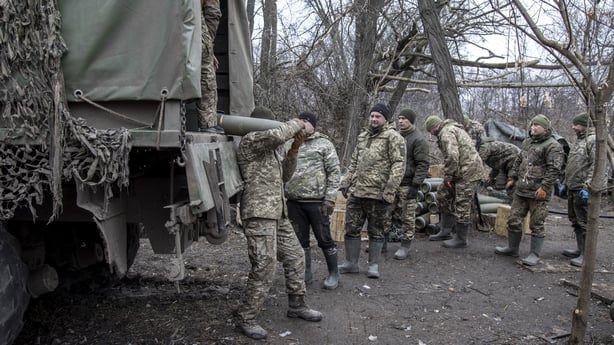European Union foreign ministers have agreed on a €2bn plan to raid their own arsenals and jointly purchase desperately needed artillery shells for Ukraine, diplomats said.
Meeting in Brussels, the ministers backed a multipronged initiative - to be endorsed by EU leaders at a summit this week - that aims to provide Ukraine with one million shells in the next 12 months as well as replenish EU stocks.
Kyiv has complained that its forces are having to ration firepower as Russia's year-long invasion has turned into a grinding war of attrition.
Ukraine has told the EU it wants 350,000 shells a month to help its troops hold back Moscow's onslaught and allow them to launch fresh counter-offensives later in the year.
"More artillery ammunition for Ukraine as fast as possible," Ukrainian Foreign Minister Dmytro Kuleba urged in a social media post.
More artillery ammunition for Ukraine as fast as possible. This was the main focus of today's EU Foreign Affairs Council. I anticipate the swift adoption of big decisions which will bolster Ukraine's capabilities on the battlefield. pic.twitter.com/oQpIZDa3EJ
— Dmytro Kuleba (@DmytroKuleba) March 20, 2023
France's Foreign Minister Catherine Colonna insisted "we have to help Ukraine more, quicker and now".
The first part of the plan commits a further €1bn of shared funding to try to get EU states to tap their already stretched stocks for ammunition that can be sent quickly.
The second part would see the bloc use another €1bn to order 155-millimetre shells for Ukraine as part of a massive joint procurement push intended to spur EU defence firms to ramp up production.
Buying weaponry together on this scale is a major new step for the EU, which has seen long-standing efforts to work more in unison on defence propelled forward by Russia's war.
Countries have been wrangling over details, like whether it should be the EU's defence agency or the member states who negotiate the orders and if they should buy only from producers in Europe.
Diplomats said the plan targets sending the first €1bn worth of shells to Ukraine by the end of May and signing the joint contracts by the start of September.
Lithuanian Foreign Minister Gabrielius Landsbergis said the ambition was to supply one million rounds over the next year, but it was not set in stone.
"It is possible that we might not be able to reach it," he admitted.
How much in stocks?
After 12 months of eating into their stockpiles, there are questions over how much EU countries can share immediately without leaving themselves vulnerable.
The bloc has already committed a wide range of military support worth €12bn to Ukraine, with €3.6bn from a joint fund used to help cover the costs.
Officials say that, since the Russian invasion last February, €450m from the fund have gone on supplying 350,000 shells to Ukraine.
Key to getting countries to deplete their stocks is convincing them that European industry can step up to produce more.
Ukraine's consumption of ammunition currently far outstrips the amount its Western backers are manufacturing.

Brussels said EU firms need to switch to "war economy mode" after scaling back in the years following the end of the Cold War.
The industry complains that governments have not yet signed the long-term contracts they need to invest in more production lines.
The EU is hoping that placing a mammoth joint order for 155-mm shells will incentivise companies to ramp up their output.
But there are concerns about the supplies of key components such as explosives.
"We are used to production that is for the peacetime and this time we are in war in Europe," Finnish Foreign Minister Pekka Haavisto said.
"This will take time of course, there is also some lack of the materials and so forth."
It has begun reaching out to 15 firms in eleven EU countries that make the ammunition to urge them to push ahead.
Brussels has said it is looking to iron out regulatory bottlenecks, ease access to financing and even provide central EU funds to help boost capacity.
But several European diplomats say the proposals remain vague and that their capitals need more reassurances that they will have an impact.
Peace negotiations
Meanwhile, Chinese president Xi Jinping is expected to reaffirm his close ties with Russian President Vladimir Putin as he embarks on a state visit to Russia.
The consensus view in the West is that any peace negotiations will be determined by what happens on the battlefield in Ukraine, and that outcome in turn could be determined by which side has the greatest reserves of artillery shells.
Ukraine desperately needs 155mm shells as it is burning through in a month what a small country can stockpile in a year.
In the longer term member states want to beef up Europe's defence industrial base, hollowed out after a slump in spending following the end of the Cold War.
However, it has been reported that European munitions manufacturers are struggling to secure the raw materials needed to quickly deliver artillery shells, and that as such the costs of manufacture are going up.
Additional reporting Tony Connelly

